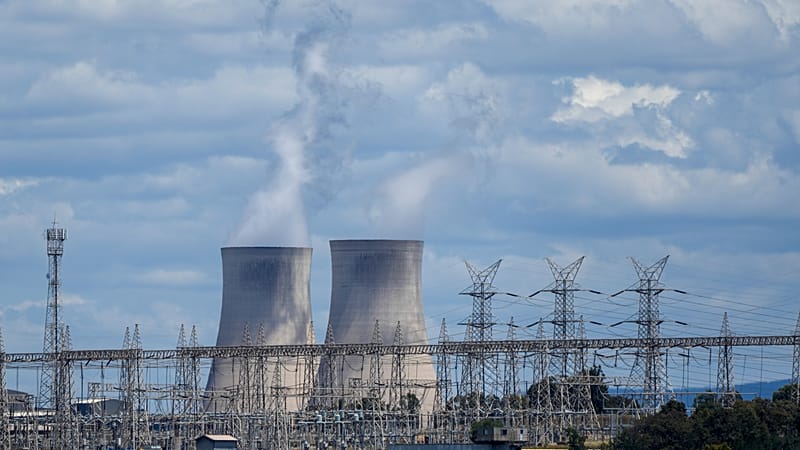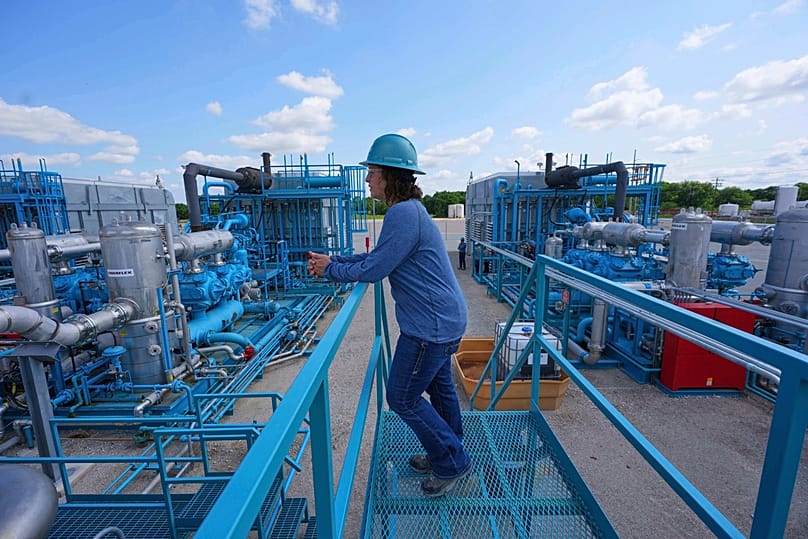Are carbon rating agencies the key to avoiding greenwashing?

With the European Union bringing back the use of carbon credits as a mechanism to help European industries and businesses offset their greenhouse gas emissions, Euronews talked to Sebastien Cross, co-founder and chief innovation officer at the London-based carbon rating agency BeZero Carbon.
Founded in 2020, the agency's primary role is to assess carbon credits and analyse the likelihood that they offset a tonne of carbon, a method analogous to the way financial rating agencies assess the probability of default on bonds and financial instruments.
"What we do as a rating agency is rate credits," Cross said. "We don't provide the methodologies, we don't accredit. We look at the credits and say what is the likelihood that these credits actually reflect one tonne of carbon emitted, which all of them are labelled as doing."
The EU27's carbon market, the Emissions Trading Scheme (ETS), allows European companies to buy and sell permits to cover their emissions. Until 2020, the bloc used carbon credits, then known as Clean Development Mechanism (CDM) credits, which allowed wealthier nations to earn credits by investing in sustainable projects in developing countries.
The use of CDMs was ditched after accusations of greenwashing, over-crediting, and diversion from genuine efforts to cut emissions at home. However, with the advent of the EU's 2040 climate target law, which is designed to slash greenhouse gas emissions by 90%, the bloc is once again considering the use of international carbon credits to reduce 5% of its emissions.
Maturing carbon markets
BeZero's agency co-founder said governments that use ratings are seeking help to assess the creditworthiness of the credits they're purchasing under Article 6 of the Paris Agreement.
"We've seen interest from governments in using ratings as a tool as they look to design how they want to use carbon credits in their compliance systems," he said. "And so obviously the discussions in the EU are very interesting from this perspective."
Cross noted that a lot has changed in the last five years, including the mindset about risk and the actual performance of carbon credits.
"The rating agency is providing buyers and investors with a measure of risk to understand the actual underlying dynamics," he said, noting that five years ago, carbon markets didn't have any risk metrics attached at all.
Cross said carbon markets are becoming more mature, which he hailed as a positive development given the increased political focus on carbon credits and their role in decarbonisation.
A global carbon markets pledge was recently endorsed by the EU, Brazil, China, France, Germany, and the UK, among others, on the sidelines of the COP30 climate summit. The move signals a wide intention to develop mechanisms for carbon pricing and a global carbon market.
Carbon credits are issued in two distinct systems: the compliance market and the voluntary market.
Governments run the compliance market, in which certain companies must buy official permits that allow them to release a set amount of CO2 under strict laws and limits.
The voluntary market, meanwhile, allows businesses to buy credits from environmental projects, such as forest protection or clean energy, to reduce their carbon footprint.
However, as Cross explained, with the EU open to including carbon credits as a decarbonisation tool and integrating the Paris Agreement's Article 6 into their targets, it will be the EU or the member states that set the price for credits.
"We need to see higher carbon prices to maintain the incentive to decarbonise," Cross said. "And the concern is that if you are letting in credits abroad, then you depress the carbon price and it does not incentivise companies to invest in the things they need to decarbonise domestically."
He also shared concerns about the implications of integrating carbon credits into the ETS, as the EU27 is currently mulling the inclusion of permanent carbon removals in its scope.
"There's a perceived risk that it will reduce the ETS price, as you'll have cheaper credits coming in," Cross said.
The validation problem
In a carbon credit system, countries or businesses that emit more greenhouse gases need to buy more credit allowances. In case they emit fewer emissions, they can sell them, thus creating a trading system for allowances.
"The carbon credit looks at an activity, or rather an intervention, that is either reducing or removing carbon and attempts to credit for that carbon that has been reduced or removed," Cross explained.
These interventions can be nature-based, such as afforestation and protecting mangroves and peatlands, or non-nature-based, such as using carbon capture and storage technologies.
"On the non-nature-based side, we have historically had lots of renewable energy credits. If you're crediting for the fact that the marginal energy that you were producing was coming from renewables and not from the grid, then you're reducing the carbon intensity," Cross said.
Whenever carbon credits are issued, businesses using them are required to make a specified amount of information public.
"When we're looking at issued projects, we can start with the publicly available information. We then engage with the developer or the project owner if some bits of information aren't clear or need to be clarified or are missing," Cross explained.
"The role of the rating agency is to bring in as much information and data as we can to interrogate the accuracy of those numbers. And that is then reflected in our headline rating."
Carbon credits' performance
Cross told Euronews that there is considerable variation between the effectiveness of different carbon credits – and that evaluating their true performance is often impossible.
"You can't observe exactly what they're achieving because you have factors in there like counterfactual baselines where you can't observe it, you're just trying to estimate it," he said. "There's never perfect data behind the number of credits that are issued."
In the case of direct air capture of carbon dioxide from the atmosphere, for instance, there is plenty of information available for assessment, because the technological systems will determine how much carbon is being separated from other air components and transported. However, a baseline figure still needs to be determined for assessing how much impact these efforts are actually having.
"It's the most contentious part of a carbon credit project – trying to figure out what would have happened were the project not to be going ahead – because that's what you need to credit between those two lines," Cross said.
This is one of the reasons the EU struggled with CDM integration, he explained, because several projects falsely claimed they were doing something that would lead to a certain number of emissions being avoided.
"The key difference now is the availability of tools like ours, which let you actually understand what is being achieved at the project level," he added, referring to satellite imagery and technologies more advanced than anything previously available.
Today


